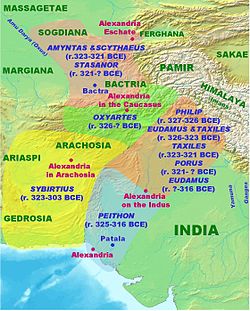Eudemos (General)
Eudemos ( Greek Εὔδημος ) or Eudamos († 316 BC ) was an officer of Alexander the great and one of his diadochi .
Eudemos took part in Alexander's Asian campaign as a commander (taxiarchos) of a division of Thracian warriors. Presumably he was already 326 BC. He was left behind with his Thracians in the north Indian province as an officer of the satrap Philip . This was murdered in the same year by mutinous mercenaries, whereupon Eudemos was used there. Alexander ordered that he and the local Indian King Taxiles should jointly administer the area.
Taxiles and Poros received as a result of the imperial order of Babylon after Alexander's death in 323 BC. Their kingdoms officially returned. At the conference of Triparadeisos 320 BC This order was confirmed by the victors of the first Diadoch war. However, Eudemos apparently remained the military commander in this region.
After that, nothing more was reported about Taxiles. According to current research opinion (based on the sources) Eudemos was 317 BC. Involved in the murder of Poros, from whose army he appropriated 120 war elephants . Otto Stein assumed, however, that statements about Poros and Taxiles were mixed up in the sources; therefore it was not Poros but Taxiles who were murdered by Eudemos. Perhaps Eudemos also drove Peithon out of his south Indian satrapy, with which he should have asserted himself as the sole ruler of the Indus. With his war elephants as well as 300 infantrymen and 500 mounted men, he joined the army of Eumenes of Kardia for the fight against Antigonos Monophthalmos . In the battle of Paraitakene he commanded the left wing of Eumenes. At the Battle of Gabiene in 316 BC However, Eudemus was captured and executed by Antigonus.
The Indian satrapies were then no longer awarded, probably because the Macedonian rulers had dissolved there and the local Indian dynasts made independent. In the following years the Indus valley came under the rule of the Maurya Empire .
literature
- Waldemar Heckel : Who's Who in the Age of Alexander the Great. Prosopography of Alexander's Empire. Blackwell, Oxford et al. 2006, ISBN 1-4051-1210-7 , p. 120, (with references).
Remarks
- ^ Curtius Rufus 10, 1, 21. Cf. also Atkinson's comment on this point: Curtius Rufus. Histories of Alexander the Great. Book 10 . Translated by John C. Yardley, introduced and commented on by JE Atkinson. Oxford University Press, Oxford / New York 2009, pp. 91–93.
- ↑ Arrian , Anabasis 6.27.2.
- ↑ Diodorus 18,3,2; Dexippos , story after Alexander , fragment 8 (in the Felix Jacobys edition ) or fragment 1 (in the Gunther Martins edition).
- ↑ Otto Stein: Taxiles. In: Paulys Realencyclopadie der classischen Antiquity Science (RE). Volume VA, 1, Stuttgart 1934, column 80 f.
- ↑ Diodorus 19, 14, 8.
- ↑ Diodorus 19, 27, 2–30, 10.
- ↑ Diodorus 19, 44, 1.
| personal data | |
|---|---|
| SURNAME | Eudemos |
| BRIEF DESCRIPTION | Macedonian general and governor |
| DATE OF BIRTH | 4th century BC Chr. |
| DATE OF DEATH | 316 BC Chr. |
